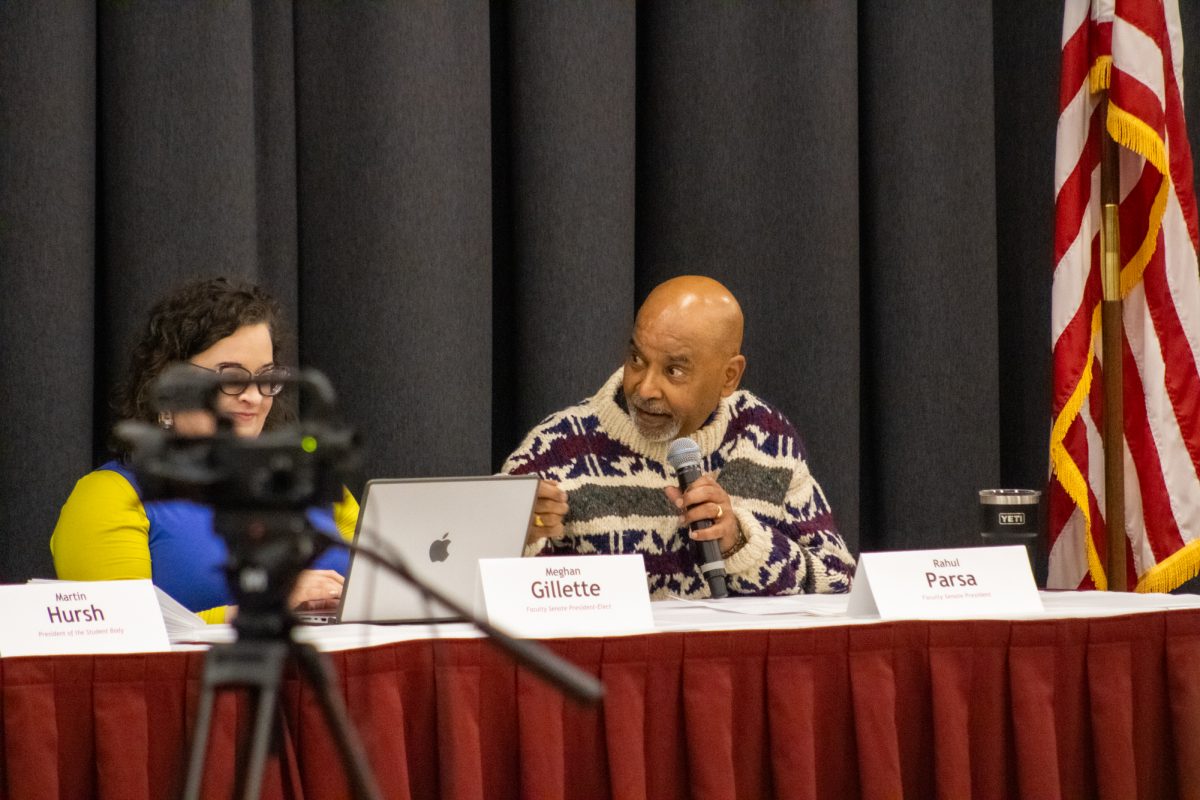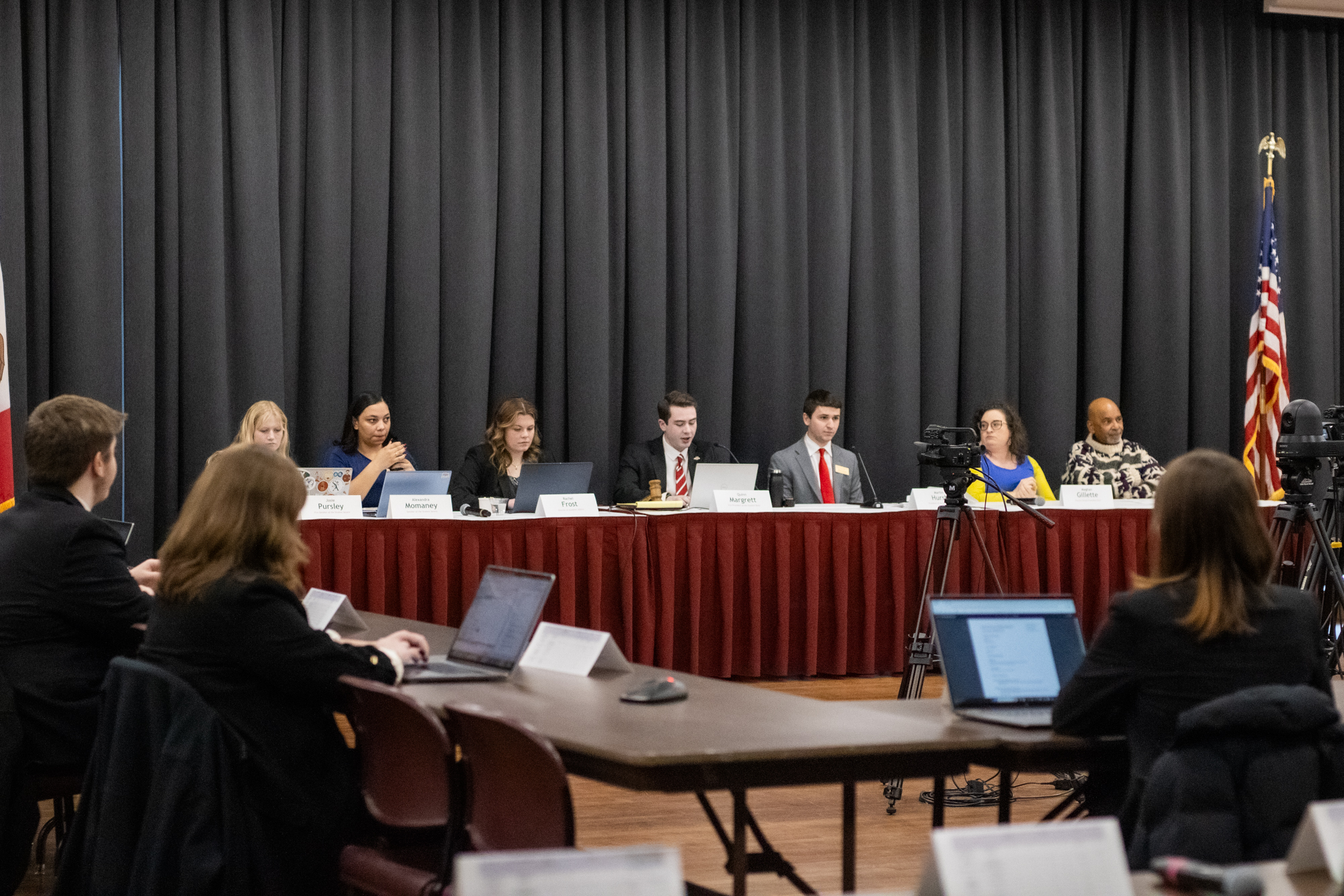
Taniyah Britt
Faculty Senate President Rahul Parsa congratulating and thanking all of student government and what they have done as a whole on Feb. 17, 2025, Sun Room, Memorial Union, Ames, Iowa.
Student Government and the Faculty Senate had their first-ever joint meeting Monday evening. The meeting was a conversational working meeting as the governing bodies discussed AI and online classes, among other topics.
“We wouldn’t exist without [students],” Faculty Senate President Rahul Parsa said. “We want to know what you want or what’s good for you, what you like, what you don’t. So this is a great opportunity.”
Senators shared their broad range of experiences with hybrid learning, school cancellations and online-only classes offered at Iowa State.
“I know that classes have been moved online tomorrow morning because of how cold it is, but I think that the standards could be a little bit looser on it, not only taking into account safety of students but also comfort,” Kevin O’Connor, a junior in chemical engineering said. “Below zero, while it’s still possible to go outside and walk to classes, it’s really, really cold and uncomfortable, and with how much hybrid learning has developed since COVID, I feel like that on days that below zero, it can be moved online more.”
Students also shared their perspectives on the challenges of online learning regarding student and faculty interactions.
“I have had the opportunity to take multiple online classes, and while they’re great for time efficiency, it is more difficult to build relationships with other students and your professor,” Ella Aiono-Dimoff, a junior in political science, said. “It can be intimidating to go to the office hours, so you can help with the online courses rather than in person. That’s just kind of been my experience.”
Faculty weighed the advantages and drawbacks of different types of courses and how they translate into online courses.
“For some courses, it might work better, but for some other courses, it won’t because, for example, I teach Chinese language and culture,” Sen. Tonglu Li, professor of Chinese, said. “For the cultural courses, it’s okay, you do the lecture, and then you have students do the group discussion. But for language, it really doesn’t work because language is for communication, for real communication, right? You have to see the students, and you have to see each other’s faces and body language. So I think, at least from my experiences, it’s not an easy decision to move everything online or to hybrid.”
The senators also discussed microcredentials and soft skills.
“[Microcredentials] are like badges that you would get, that you could then show to an employer that you had completed a certain number of things to show that you have a competency and a skill,” Sen. Jennifer Schieltz, the Faculty Senate chair of academic affairs, said. “The university is moving towards making more of these academic affairs councils, trying to figure out exactly how we fit in with either overseeing those or not, because currently, they’re not for credit, they’re just value-added things.”
Various professors explained that microcredentials are meant to be short, focused programs that allow individuals to gain and showcase specific and narrowly tailored skills.
“Something to differentiate yourself is that’s a whole idea of this,” Sen. Juan Carlos Cordoba, professor of economics, said. “If you don’t have the room for a minor or joint major.”
Senators also talked about the use of AI in classrooms and how it can serve as a valuable learning tool, rather than just providing answers for assignments.
“I do a lot of research articles and literature reviews, and finding sources can be like the bane of my existence, especially when it comes to annoyed bibliographies,” Sen. Alexandra Momaney, a senior in global resource systems, said. “Somebody from the library came and showed us AI sources to help us find sources, and even summarize them to see if they’re applicable to the research that you’re looking for. So I think that maybe a joint effort to get those AI products out there, rather than the ones that do your homework for you.”
Student Government is slated to have its next meeting Wednesday. The next Faculty Senate meeting for March 4.
